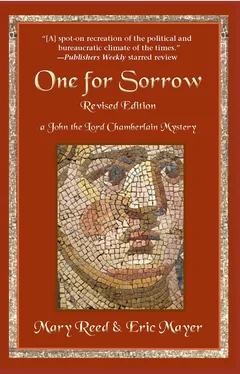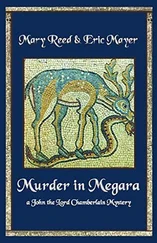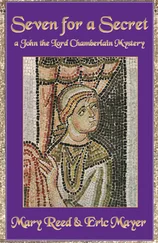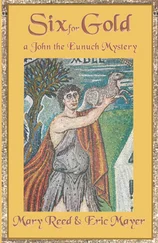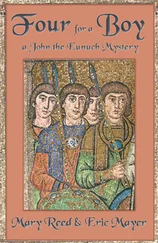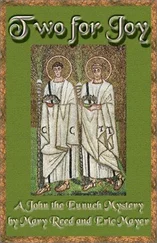Mary Reed - One for Sorrow
Здесь есть возможность читать онлайн «Mary Reed - One for Sorrow» весь текст электронной книги совершенно бесплатно (целиком полную версию без сокращений). В некоторых случаях можно слушать аудио, скачать через торрент в формате fb2 и присутствует краткое содержание. Жанр: Исторический детектив, на английском языке. Описание произведения, (предисловие) а так же отзывы посетителей доступны на портале библиотеки ЛибКат.
- Название:One for Sorrow
- Автор:
- Жанр:
- Год:неизвестен
- ISBN:нет данных
- Рейтинг книги:4 / 5. Голосов: 1
-
Избранное:Добавить в избранное
- Отзывы:
-
Ваша оценка:
- 80
- 1
- 2
- 3
- 4
- 5
One for Sorrow: краткое содержание, описание и аннотация
Предлагаем к чтению аннотацию, описание, краткое содержание или предисловие (зависит от того, что написал сам автор книги «One for Sorrow»). Если вы не нашли необходимую информацию о книге — напишите в комментариях, мы постараемся отыскать её.
One for Sorrow — читать онлайн бесплатно полную книгу (весь текст) целиком
Ниже представлен текст книги, разбитый по страницам. Система сохранения места последней прочитанной страницы, позволяет с удобством читать онлайн бесплатно книгу «One for Sorrow», без необходимости каждый раз заново искать на чём Вы остановились. Поставьте закладку, и сможете в любой момент перейти на страницу, на которой закончили чтение.
Интервал:
Закладка:
While the bear occupied itself, drawn swords and daggers glinted and a few onlookers cautiously moved toward the oblivious animal.
John didn’t wait to see what happened. He glanced about for Felix and, failing to see him, moved toward an alleyway as the quickest route of escape.
The alley was little more than a crevice between buildings which leaned toward each other overhead. Away from the fire-lit square, the night was impenetrable. Unseen cobbles were slippery underfoot. John steadied himself by running a hand along the rough side of the wall of the tenement opposite Isis’ house. He heard a rat skitter out of his way. The air stunk.
His boot was caught by something soft but bulky and he toppled forward. His knee banged down painfully on the stones.
Darkness shimmered before his eyes, dropping a veil of black silk as he scrambled to hands and knees. At least, he thought, the cobbles here were dry. He was blinking, trying to see what had tripped him, when shutters flew open directly above and closed just as quickly.
In the flash of light from the window John looked down into a pale but familiar face. The eyes were wide open, blue lips drawn back.
John spoke the man’s name, but his friend did not answer.
Chapter Two
During the afternoon, when the dead man was still alive, John had sat with him and the others at the Hippodrome. Between the chariot races there had been other entertainment. Acrobats, wild animals. A trained bear.
The bear amused the spectators when it was down on the floor of the Hippodrome and not in their midst. They shouted their approval from the safety of the stands as the animal lashed out futilely at its trainer. Restrained by a chain, the bear could not quite reach the man’s wagging buttocks.
Shifting his lean flanks on the hard marble bench, John had sympathized with the wretched bear. This afternoon he felt chained himself. Chained by his high position at the court, weighed down by his richly embroidered ceremonial robes. The sunlight was too fierce for early May. A tepid sea breeze did nothing to relieve his discomfort.
What did the friends beside him make of it, he wondered?
Felix, the excubitor captain, scowling intensely, was probably gauging the trainer’s deftness with the trident he was brandishing at the bear.
Anatolius, who wrote poems when he was not serving as imperial secretary, looked as if he were only half-attending to the performance. The handsome and elegantly dressed young man might be composing an ode, but to the bear or to its tormenter?
The Keeper of the Plate, Leukos, was a kind man, a devout Christian. John was not surprised to notice him frown and look away as the trainer darted in at the captive animal, prodded it with the trident, pirouetted, and retreated.
“I suppose our empress is enjoying the entertainment,” remarked Anatolius, “considering her father was a bear keeper.”
“Indeed.” From his seat in the emperor’s box, John could see only the backs of the elevated thrones occupied by the emperor and empress. Theodora’s father had died when she was a child, leaving her family destitute. The racing partisans known as the Greens had turned them away but the Blues had offered charity. Which was why she had spent the afternoon raucously cheering for the Blue chariot teams with all the exuberance of a fisherman’s wife.
As an adult she had turned to acting and caught the eye of Justinian. Otherwise she might have been down in the dust assisting the bear trainer instead of observing from a throne.
The bear was chained to a stake directly in front of the imperial box. The trainer broke into a run, circling the stake with a comical, high-stepping gait. The bear, though encumbered, pursued him, still hopeful of exacting revenge for its injuries. So intent was it on its pursuit that it did not notice that every turn around the stake wound its chain tighter, shortening it inexorably so that suddenly the beast found itself trapped, unable to move.
The bear roared its pain and fury to the unheeding sky as its trainer gave the beast’s shaggy back a final vicious dig with his trident.
The crowd responded with coin-throwing enthusiasm as the bear trainer finally departed with his ill-treated charge and slaves, swathed in whirling dust devils, removed the stake and raked the arena’s churned floor smooth.
“I wish the only enemies I had to guard against were bears attached to lengths of chains,” grumbled Felix.
“Don’t worry,” offered Anatolius. “You don’t have any enemies here. At least not within arm’s length. You lost our bet though. The bear didn’t draw blood.”
Felix grunted. “Maybe next time it will.”
“Since our enemies don’t have chains, our best defense is to learn which way they are going to jump,” remarked Leukos. He ran a thin hand across his gleaming, bald scalp. Behind his back the apprentices said their master’s skull so resembled a silver bowl that there must be an imperial seal stamped behind one ear.
Anatolius pushed a few dark curls off his forehead and regarded Leukos with surprise. “Why have you been so gloomy this afternoon? What enemies do you have?”
“We all have enemies. You might want to consult the soothsayer who has recently arrived in the city. Perhaps he can point out a few of yours for you.”
“Oh, I’ve heard about him. Who hasn’t? He disemboweled a chicken for a certain office holder we won’t name and was able, from its guts, to assure this august personage that he would not end up like the unfortunate chicken, or at least not for a week or two. I’m visiting the soothsayer later.”
“He’s going to be busy today,” Leukos said. “I have an appointment with him at the inn in a short while.”
“Do you both think it’s wise?” put in John. “It might cause the emperor embarrassment if anyone spots his officials dealing with a charlatan like that.”
“Actually, he’s very knowledgeable,” Leukos replied. “I’ve already had him cast the augurs for me.”
Felix shook his head. “Leukos, you of all officials must be aware that the more plausible the rogue, the tighter you need to hold on to the silver. You can’t trust people these days.”
Anatolius grinned broadly, an expression which diminished somewhat his resemblance to a classic Greek sculpture. “Are you thinking of these kidnappings and extortion plots we’ve been plagued with lately, or the street violence, or…” he paused for effect, “…is it that little tart at Madam’s?”
Felix’s directed a chilly gaze at him. “You’re a gossip, Anatolius. If you don’t watch your tongue you’ll lose it.”
Anatolius pretended to look hurt. “That’s unfair, Felix. Gossips are the ones who spread tales about the patriarch’s tribe of illegitimate children-such slander to cast at a churchman-and swear that the emperor is really a faceless demon in human form. I just pass along the news.”
Leukos stood up. “I have to be off to see the soothsayer. I’ll be glad to be out of this sun.” He fumbled with the leather pouch he carried on his belt, closed it, and wiped the sweat from his broad forehead with the back of his hand. “Do you want to come with me, Anatolius?”
“I can find the Inn of the Centaurs, Leukos. I think I’ll stay for the next performance and another race or two. I’m not supposed to call on him until the end of the afternoon.”
A moment after Leukos had left the imperial box the massive teak gate at the far end of the chariot track slid open and, as the crowd cheered, a monstrous black bull garlanded in blossoms and ribbons charged out into view. The bull raced around the arena’s perimeter, violently tossing gold-tipped horns.
John drew in his breath sharply. The magnificent beast was the perfect incarnation of the sacred animal of the Lord of Light, John’s own god.
Читать дальшеИнтервал:
Закладка:
Похожие книги на «One for Sorrow»
Представляем Вашему вниманию похожие книги на «One for Sorrow» списком для выбора. Мы отобрали схожую по названию и смыслу литературу в надежде предоставить читателям больше вариантов отыскать новые, интересные, ещё непрочитанные произведения.
Обсуждение, отзывы о книге «One for Sorrow» и просто собственные мнения читателей. Оставьте ваши комментарии, напишите, что Вы думаете о произведении, его смысле или главных героях. Укажите что конкретно понравилось, а что нет, и почему Вы так считаете.
